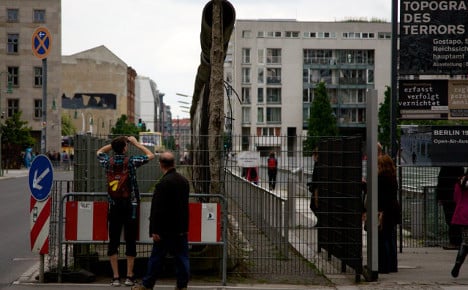P { margin-bottom: 0.08in; }
From happenstance encounters with people as he walked the 160 kilometre route, Paul Sullivan found out about how ordinary Berliners experienced life with the Wall – and how things have changed since it was torn down.
"There wasn't anyone we met who didn't have anything interesting to say.
“One woman said that her sister was in the East and they were divided,” he remembers. “It wasn't much of a problem, because she was from the West and could go and visit quite regularly.
“When the Wall came down they didn't visit each other so regularly, they didn't feel like they needed to, didn't have the same urge to do it.”
It was access to this kind of insight that prompted Sullivan and Paul Scraton to start their essay-writing and photography project which became their book, titled "Mauerweg: Stories from the Berlin Wall trail".
Sullivan, founder and editor at Slow Travel Berlin, and Scraton, also a writer and tour guide, are intimately familiar with the Wall – although Sullivan's first visit to Berlin from the United Kingdom didn't win him over straight away.
“I came for the first time in 1999,” he says. “It was winter and I remember it being really bleak, standing on Alexanderplatz and thinking, 'this is really hardcore', I didn't really get it.”
Ten years later, moving to Berlin with his German partner and their child, he finally came to understand that “it was a fascinating city, on every level.”
Having spent the years since writing about the city and guiding people around some of its less-known spots, the 25th anniversary of the Wall coming down felt like the right time to celebrate his adopted home.
“The Wall has kind of recrystallized for me instead of disappearing or being swept away,” Sullivan explains.

“We wanted to mark the occasion, we wanted it to be personal.
“There are different tiers of memorial or monument in Berlin,” he argues. “Things like Checkpoint Charlie are really on a superficial tier compared to something like the Bernauer Strasse memorial.
"There's just a lot of touching, euphoric but also really devastating stories,” at the official Wall memorial site, he notes.
Confronting the past
For modern Berlin he says, there's been a tendency this year to use the Wall as a kind of commercial platform for celebrating the city.
“In one way that's obvious and great, but I think it's important also to remember these stories, because that's the part that's important in order to stop these things happening again," Sullivan says.
One man he came across during his circuit raised the difficulty that modern Germany still faces in dealing with its past.
“One thing that always puzzled me,” he told Sullivan, “was how so many were willing to defend and kill their own neighbours for their country – but they were all completely silent about it after the Wall fell…”
But the Mauerweg's very existence is, for Sullivan, part of what makes Germany's way of dealing with the past so unique.
“Germany's become a role model for dealing with the aftermaths of dark, tortured and troubled histories and different cultures,” he points out.
However, “it's important to remember that that wasn't an immediate thing, that isn't something natural in their culture.
“It's been a learning curve for German people as well.”
That's why he always encourages visitors to make stops at the Stasi museum and the Hohenschönhausen prison, where the infamous East German secret police kept its victims.
And the Mauerweg itself, based on the paved path where East German guards once patrolled, is something which people spent years fighting to have preserved.

“The temptation would have been to get rid of it and forget about it, but it becomes apparent you can't do that,” he says of the long struggle to officialize the trail.
Now Germans are “very unflinching” in their confrontation of the past, he finds.
“In a city like Berlin you really notice that.”
Ultimately, Sullivan admits, he has “a very expat interest” in the Wall, which can only be “superficial” compared with the experiences of the people who lived with it for decades.
What he hopes he's achieved is to highlight some of those lives before they disappear from history, rather than retread familiar ground.
“It's not just about stories from the past, but stories from the present,” Sullivan says, “and the way the Wall is still influencing and creating stories even now.”
You can pre-order the book here.
Find out more about the Mauerweg at the Visit Berlin website.


 Please whitelist us to continue reading.
Please whitelist us to continue reading.
Member comments